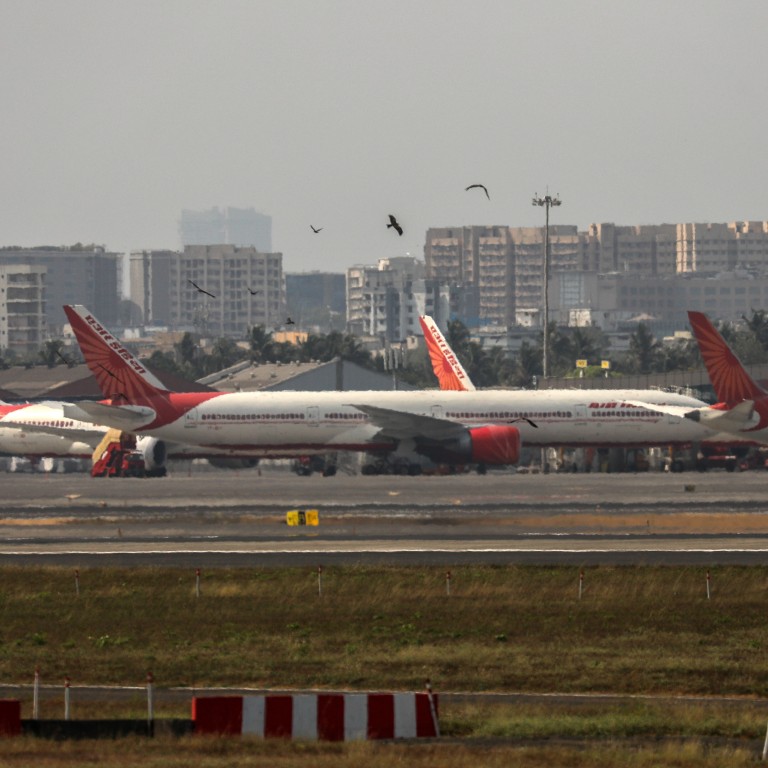
Ban on Air India flights to Hong Kong ignores imported coronavirus cases travelling to city via connecting flights, analysis shows
- Though Air India passengers account for most imported cases from India in recent weeks, data shows others are arriving from other locales
- Experts say the revelation raises questions as to why Air India is being singled out, and whether it may be necessary to strengthen preflight requirements
Despite recent government actions aimed at preventing Air India from carrying coronavirus-positive passengers into Hong Kong, a review by the Post has found that direct flights only account for part of the issue, with connecting flights from other locales also bringing in several cases from India.
At least 44 cases imported from India have emerged since stricter public health restrictions were imposed on high-risk countries. Nineteen of the cases can be traced to a single August 14 flight operated by India’s national airline, triggering a two-week ban on Air India flights to the city by Hong Kong authorities. Five other cases were linked to an Air India flight from Delhi on August 11, and eight more were on another flight from Delhi a week before that.
The number of cases linked to these flights has slowly ticked up as passengers test positive during the city’s mandatory 14-day quarantine period.
An aviation specialist and a health expert have said the revelations raise questions on why only Air India had been singled out, and whether it was necessary to strengthen preflight testing requirements.
Air India was banned from operating flights to the city until the end of August when an initial 11 Covid-19 cases were detected upon arrival in Hong Kong aboard the August 14 flight. The number had risen to 19 by Saturday.
Since July 25, the Hong Kong government has required travellers from high-risk countries – including India, Pakistan, the Philippines, Indonesia and the United States – to secure a negative Covid-19 test with certification and validation within 72 hours of departure.
Hong Kong’s low-income residents suffering more under pandemic: survey
Poonam Nanda, director of Hong Kong-based travel operator GC Nanda & Sons, said the government should tighten its requirements for where passengers were tested to ensure the quality of the results and that they would be accepted for travel.
“The data makes a compelling case to lift restrictions on direct air links provided strict protocols remain and are enforced,” she said.
The agency, which is the largest on the India route, has organised and operated a Covid-19 repatriation flight, and credited its trouble-free operation to the oversight of the Security Bureau for coordinating and managing the returnees.
“It is contradictory to ban direct flights when allowing Indian-originating passengers to slip into Hong Kong via transit flights over Doha, Singapore, Kuala Lumpur and others,” Nanda added.
Hong Kong officials push Covid-19 testing scheme amid increasing resistance
Air India declined to comment, and the Consulate General of India was not immediately available for comment.
Without elaborating on the specific cases, a Singapore Airlines spokesman said: “Our current check-in procedures for customers from India to Hong Kong conform to the requirements by the Hong Kong Department of Health.”
Chinese University’s Dr David Hui Shu-cheong, a member of the government’s expert committee on public health, said for one flight to have a high number of positive passengers who purportedly tested negative before departure suggested “something wrong with the testing”.
“Up in the air, the ventilation is so efficient … I don’t think the passengers acquired the infection in-flight,” the infectious disease expert said.
Coronavirus latest: India’s cases cross 3 million, South Korea reports new daily high
On Saturday, India topped 3 million confirmed virus cases, adding a million in 16 days. The South Asian nation has the third-highest count of confirmed virus cases in the world.
Indian Prime Minister Narendra Modi has sought to hit a target of one million Covid-19 tests per day for the population of 1.3 billion, and was managing some 830,000 daily as of last Wednesday.
However, in order to meet such lofty goals, the country has expanded testing through a rapid antigen test, said to be less reliable than the widely recognised polymerase chain reaction (PCR) test used in Hong Kong.
The leading Indian Council of Medical Research earlier said 25 to 30 per cent of the country’s daily tests were being conducted using the rapid antigen method, according to Bloomberg.
Hui, who was comfortable with travellers from India taking detours to reach Hong Kong, said up to four Covid-19 passengers detected per flight was acceptable, but not 19. He added that the ban on Air India was to stop so many infected cases overwhelming Hong Kong in one go.
Hong Kong’s records 25 new Covid-19 cases, cluster at disabled care home
Information technology consultant Bharat Paliwal was due to fly Air India last Friday with his wife and young daughter. He underwent a Covid-19 test in a public hospital last Tuesday and took exception to Hong Kong concerns that Indian tests were substandard.
“I have strong faith in the … India facilities, especially [since] the current Covid-19 pandemic situation and protocols related to it are being followed rigorously, as per my recent test experience,” the 32-year-old said.
Paliwal, who is still stuck in India, also said he doubted people were taking fake tests.
“I personally do not believe so,” he said. “Everyone returning is well aware about stringent measures inn Hong Kong and no one intentionally will do that.”
The Post has reached out to health authorities for comment.
Globally, more than 22.9 million cases have been confirmed. As of Sunday, Hong Kong had recorded 4,682 confirmed cases, with 77 related deaths – many of them occurring during the city’s ongoing third wave of infections.

